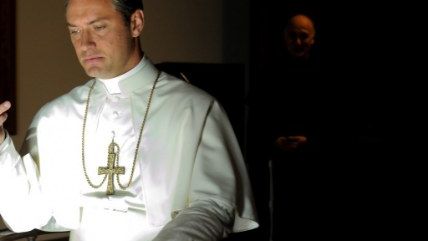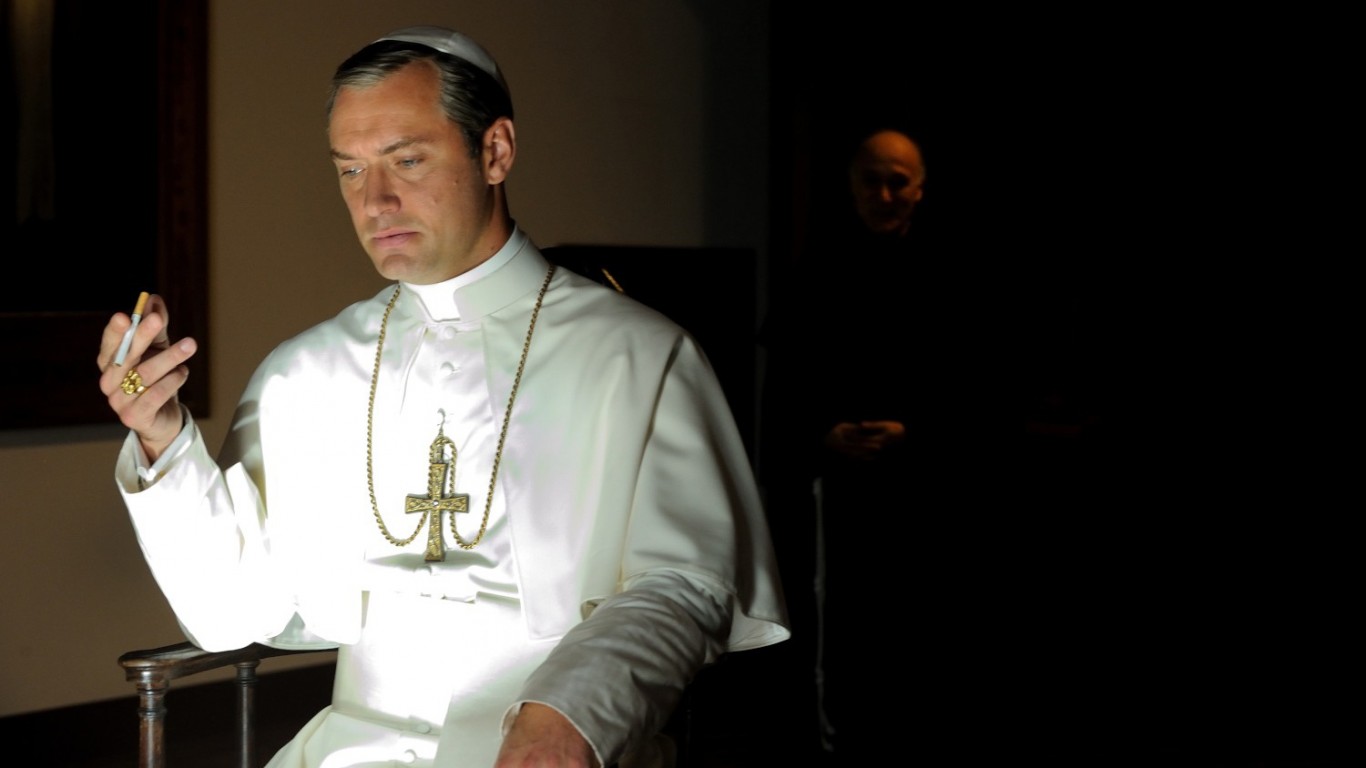The Young Pope: Entertaining but Incoherent
A story of unchecked ego in HBO miniseries.


The Young Pope. HBO. Sunday, January 15, 9 p.m.
Television's last excursion into papal politics—Showtime's The Borgias, in which Renaissance bad boys Alexander VI (better known to history by his birth name, Rodrigo Borgia) and Guiliano della Rovere (the future Julius II, the guy who bullied Michaelangelo over painting the Sistine Chapel) boinked and butchered their way across Europe—was debauched.
The newest one, HBO's The Young Pope, is merely dazed: stylistically, narratively, theologically. Part soap opera, part jeremiad, and part dark comedy, its various incarnations don't always mesh very well. It strives for epic magnificence and falls well short of coherence.
And yet it's kind of entertaining. In short, it's the 2016 of TV series. Watch it, enjoy it, but don't be surprised if you wake up with a hangover that feels like a Vladimir Putin lobotomy.
An Italian-British-American co-production, The Young Pope has already aired in Rome with big ratings, though that doesn't necessarily mean much in a country driven to distraction by even the most mildly tittilatory material about the Vatican. Work has already begun on a second season, though HBO continues to bill it as a miniseries ("limited series," in current jargon), which suggests the network isn't convinced Americans will be quite as unhinged to see that the pope actually takes his shirt off at night.
The title character is 47-year-old Lenny Belardo, the youngest pope since the 11th century, and the first American. (Naturally, he's played by a Brit, Jude Law.) Belardo's election was an upset managed by the Vatican's secretary of state, the sinister Cardinal Voiello (Italian film veteran Silvio Orlando), who wanted a charismatic but pliant pope—a "telegenic puppet," in the words of one church cynic—to carry out his agenda.
Belardo predictably follows Hollywood rules about unpredictable proteges, kicking his sponsors in their holy butts. He puts Voiello to work making his coffee while choosing as his senior adviser a maternal nun (Diane Keaton, looking about as comfortable as a nun as Mary Tyler Moore did in Change of Habit) from the orphanage where he was dumped by hippie parents. And he alarms the Vatican's powerful marketing arm by forbidding the use of his image to sell trinkets—even firing the official Vatican photographer and demanding that all his public appearances be made in a carefully shadowed environment where his face can't be seen.
But if The Young Pope's title and set-up had you expecting a warm parable about a quirky kid dumping stodgy church doctrine in favor of a warmly liberal new Catholicism that embraces Cuban peasant cooperatives and Code Pink, you're taking communion with the wrong show.
Belardo's first act after sacking the Vatican photographer is to bring back the papal tiara, an act of flamboyance that hints his reticence about his image is less about abnegation of human ego than a fear of being recognized in connection with some past transgression. He upbraids and demotes a senior member of the curia for being gay and reams the papal cook for overfamiliarity. ("I do not appreciate friendly relationships. I'm a great fan of formal ones.")
Even his chosen regnal name, Pius XIII, has dubious connotations; it's a provocative reminder of Piuses XI and XII, who played footsie with Hitler in the 1930s and 1940s. Certainly Belardo's ideas on spirituality would impress Mussolini in their style, if not content: Belardo wants the members of his church worshiping "24 hours a day, your hearts and minds full of God. And no room for free will. No room for liberty. No room for emancipation."
Running a youthful reformer type, by itself, would have made The Young Pope a challenging work. But the turmoil sown by Belardo often seems less political or theological than simply the prolonged tantrum of a spoiled brat. Despite his Dean Wormer oration on 24/7 prayer, he takes apparent pleasure in a dream in which he delivers a homily in St. Peter's Square reminding Catholics of the joys of birth control, masturbation, homosexuality, and gay marriage among priests.
He subverts the Vatican confessional box to learn secrets of the curia, and his own psychological self-inventory ("intransigent, irritable, vindictive, and I have a prodigious memory") suggest they'll be put to potent use. At times, Belardo is so schizzy that The Young Pope seems more like Catholicism's answer to Seven Days in May. It is no coincidence that one of the show's recurring images is that of a crucifix seen upside down, like a flag flipped over in a signal of distress.
This story is, at times, difficult to follow, not just for its contradictions but for its unconventional style. The Young Pope is written and directed by Paolo Sorrentino, who won a foreign-film Oscar a couple of years ago for The Great Beauty, and his fondness for helter-skelter skipping between dreams, visions, fantasies and flashbacks is rampant here.
For all that, The Young Pope is not without its weird attractions. Whether Belardo is busting cardinals for gerontophiliac fantasies about Vatican statuary that he learned about from their confessions or unleashing a kangaroo on the Vatican gardens, Law brings him to dotty and diversionary life. Law's sneering carnality is reminiscent of the scene in 1953's The Wild Ones, in which a youthful Marlon Brando plays a motorcycle punk. "Hey Johnny, what are you rebelling against?" asks a girl, to which Brando retorts: "Whadda you got?" The problem is that youthful rebelliousness eventually crosses the line into middle-age crazy.



Show Comments (47)